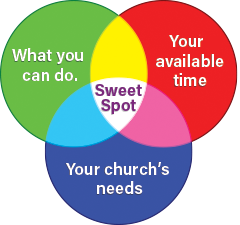 Living your life as a steward of God’s grace, means recognizing that everything comes from God and all we have is God’s.
Living your life as a steward of God’s grace, means recognizing that everything comes from God and all we have is God’s.
The scriptures invite us to see that, by the grace of God, we have more than enough in our lives to overflow into a new way of living. It connects the faith we profess to the ordinary ways we use our time and talent to live our lives
Think about how you interact with people in your life – at work, in school, at home, in your community. How can your life mirror Christ’s generous, abundant, joy-filled, hopeful love? How can our lives reflect love, justice, mercy, faithfulness?
It’s important that everything we do with our time and talent reflects our walk with Christ. We can also reflect on how we give time and talent back to God–just as we do with money.
Time and Talent
Jesus came to serve.
If it is more blessed to give than receive when it comes to our monetary gifts, how much more when we serve each other with our time and talent!
Sprinters versus Marathoners
Sometimes, when we get caught up in the demands of modern life, with its technological immediacy and 24-hour responsibilities, it can feel overwhelming to consider adding one more thing to our busy schedules to serve. We want to be involved in the church, but how do we find the time? Making a commitment to serve on a committee, sing in the choir or teach Sunday school might feel overwhelming.

“Sprinters”: Busy parishioners who may be able to serve for a few Sundays or a season.

What do you have fun doing? Remember, God loves a cheerful giver. You might be an accountant and be able to do the books (which the church might need) but if you’d have more fun teaching Sunday School because you’re exhausted looking at numbers – then teach Sunday School!
Giving Back to God
- Sharing your talents in each stage of your life takes prayer and reflection.
- Ask others to help you discern ways in which your abilities, talents and gifts can contribute to your church.
- Balance these possibilities with any limitations on your time and capacity.
- Be open to trying something new. Be willing to learn.
Dr. Kennon Callahan writes that in today’s culture, people tend to be sprinters rather than marathoners. They will participate for short periods of time rather than making a larger commitment. Many people may want to be involved in the life of the church, but feel overwhelmed by the commitment needed to serve on a committee, teach Sunday School or even take up the offering.
Congregations could actually encourage greater participation by offering individuals short, one-off opportunities to serve. For example, a sprinter might find it difficult to commit to joining the choir for the full-year (or even half a year) because they don’t know if they can make weekly practices. But they might join a choir if invited to sing at Christmas, Easter, Pentecost or some other event. You might find sprinters would even participate two to three times a year!
Likewise, a sprinter may be reluctant to become a Sunday school teacher for a full year. But they may sign up to teach one month of classes – or one class a month. They might volunteer to serve at a meal, rather than join the hospitality committee for a year. Or they might organize one community outreach event for the congregation.
We value and need the marathoners, who have the commitment and energy to provide consistent leadership for the church – and to coordinate all those sprinters! Churches need to be flexible in the opportunities they offer. The more people are involved, the stronger the congregational community will be.
The Multiplying effect of the “Time-Tithe”
What would it mean if we were to give back 10% of our time to God’s church, modeled on the biblical concept of the tithe?
For most of us, measuring this “time-tithe” as a proportion of our waking hours is overwhelming, but what if we started by thinking in terms of working hours? 10% of a 40 hour work-week is 4 hours per week. Even if we were to consider time spent in worship as part of this time we give back to God, that would still leave more than 2 hours a week remaining to give as a proportion of our time and talent in the service of our congregation: the body of Christ.
There are many ways you can give time to God through the church: teaching Sunday School, leading a Bible study, singing in the choir, collecting the offering, serving on a committee, offering hospitality, taking care of the yard. Think about what you’d have fun doing! Start small, and you may be able to grow your involvement one day.
If every member of your church were to dedicate at least 4 hours a week to your congregation, how might it multiply your congregation’s impact on your community in loving service to others and in spreading the Gospel?
The Presbyterian Church in Canada’s statement of Christian belief, Living Faith, encourages us to consider how we are called to give a proportion of our time to the work of God.
| Calling | Actions |
| We are called to work out the meaning of our own lives and to find our true vocation in the love and service of God. (2.3.1) | • Give time to Bible reading, daily prayer and weekly worship • Interact with all people—at work, in school, in the community, at home—with love, justice, mercy, and faithfulness |
| We serve and love God by the service and love of creation. We deny selfish ambition and desire in order to minister to others, especially the needy. (2.3.3&4) | • Be fully present with family • Volunteer in the church and community |
| We care for the world (2.4.1) | • Be concerned with the wellbeing of all of life • Take care of nature and eliminate waste |
| We explore ways of love and justice (2.4.2) | • Stand up for what is right • Take action on issues of justice |
For more information about Stewardship & Planned Giving, send us an email or call 1-800-619-7301.


